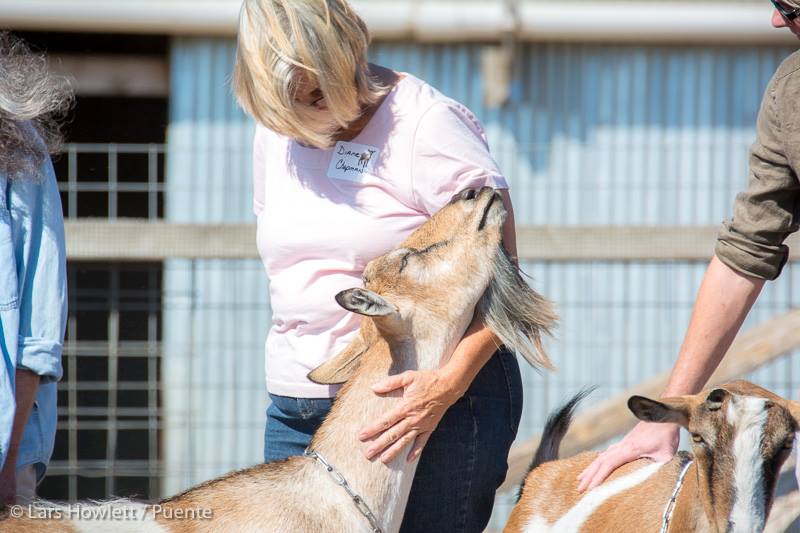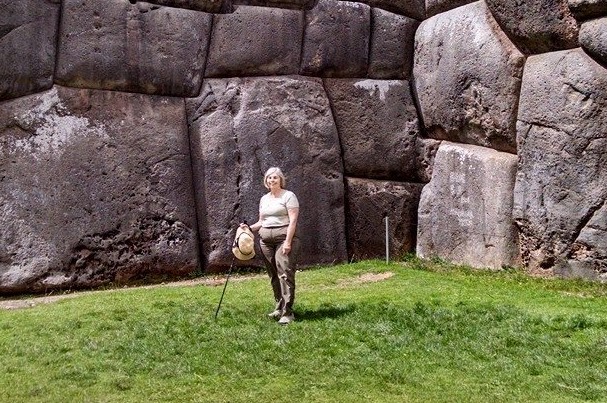When you meet Diane Chapman, chances are she’ll introduce herself as a retired accountant and leave it at that. The truth is, Puente’s current treasurer is a community pillar, an entrepreneur and an environmental activist who helped steward Puente’s finances at its inception, and she has been proud to watch it grow.
If she were a superhero, Chapman’s superpower would be to keep finances in check with a sweep of her pen. Fortunately she uses her powers for good, supporting the best causes for personal reasons. For years she oversaw finances for Jacobs Farm-Del Cabo, the pioneering organic tomato grower headquartered in Pescadero. She was a longtime treasurer for Pescadero Community Church, where she worships.
Seventeen years ago, the church welcomed a minister named Wendy Taylor who enjoyed greeting local farm workers in Spanish. Slowly, she got to know these men and came to understand how many basic necessities they lacked and how lonely their lives were. When Rev. Taylor proposed a church ministry called “Puente” to feed these workers, offer them bicycles, warm clothes and bedding, the church got behind her. Chapman especially: she did Puente’s accounting when it was in its infancy, right up until the organization became a nonprofit. She was there in the earliest days of La Sala, when Puente was volunteer-run, and she got to know the farm workers Rev. Taylor dubbed “the men alone.”
Today, Puente has more than 20 staff and recently concluded its most successful Silicon Valley Gives campaign to date, raising $140,000 for Puente’s youth employment programs. Chapman sometimes feels astonished when she walks into Puente’s offices and sees all the activity, in comparison with those earliest days. “It’s amazing when you think Puente started with $30,000. Now I can’t keep track of everyone,” she laughs. “So many people. And so many programs.”

Diane at Puentes 2014 Fall Harvest Celebration at Harley Farms.
Chapman rejoined Puente’s board of directors four years ago when she was asked to become a member of the finance committee, and then take over as treasurer. Puente Executive Director Kerry Lobel has her own description of Chapman. “She’s a force of nature. I really count on her for her perspective about how we’ve grown and changed. She’s also really managed to bring our financial efforts to a higher level.” Chapman is also a Puente donor, in addition to her volunteer hours checking Puente’s books.
Chapman and the finance committee are stewards of donors’ generosity and bring a layer of accountability to the organization. They have overseen a major growth period as Puente builds its financing infrastructure to accommodate new and expanded programs, such as Puente’s health clinic pilot project, Homework Club and preparations for DAPA, President Obama’s Deferred Action for Parents of Americans and Lawful Permanent Residents program.
“Puente is in many ways the governmental agency for the South Coast,” says Chapman. “It keeps youth employed. And this health care thing, I’m so excited about it. It’s important for these services to be available to the people here.”
Chapman has lived in Pescadero for 35 years. She raised six kids with her second husband in a house near the coast, a property they also shared with a donkey, a horse, a pony, dogs and cats. She opened and closed three stores on the coast and still owns a gift shop in downtown Half Moon Bay called Pescadero II. She was chair of the Pescadero Community Council, a precursor to the Pescadero Municipal Advisory Council, which gives locals a voice at the county level.
Locals who care about the environment remember Chapman as the driving force behind a successful campaign to stop an outside sewer agency from spreading human sewage across thousands of farming acres near Lake Lucerne, a reservoir south of Pescadero. Chapman banded together with several other women (they called themselves the “Sludge Sisters”) and fought the plan all the way to Sacramento. “We were a pain in the tush,” she recalls with a laugh. “We talked to people all over, state officials and experts – it was quite exciting.”
Chapman has watched Pescadero grow its farming and nursery sector with an influx of migrants from Mexico and Central America, including many families with Spanish-speaking children who enrolled in the La Honda-Pescadero Unified School District. She has seen Stage Road, Pescadero’s main street, transform itself into a tourist attraction with upscale cafes and artisan shops. Thanks to Puente, there’s even a weekly summer farmers’ market.
Chapman has tried Puente’s Zumba classes, done the annual 5k Run/Walk (also known as the Veggie Run), and participated in Christmas Posada, which brings Latino and Caucasian residents together in song at Pescadero Community Church, birthplace of Puente.

Diane on a recent traveling adventure.
Change can be unsettling. After her husband died, Chapman traveled to many continents and visited Spain twice to hike portions of El Camino de Santiago, a pilgrimage route for those seeking spiritual growth. Changes at Puente have heralded growth, and Puente’s finances are in very good hands thanks to the conscientious and vigilant work of Puente’s current treasurer.




